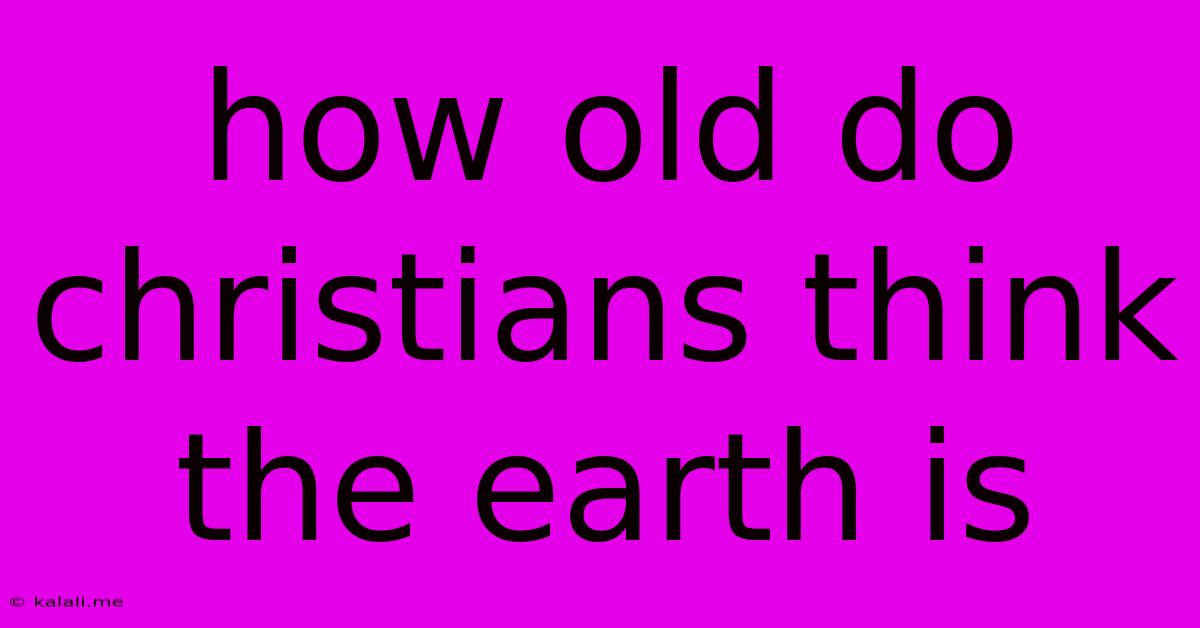How Old Do Christians Think The Earth Is
Kalali
Jun 09, 2025 · 3 min read

Table of Contents
How Old Do Christians Think the Earth Is? A Look at Diverse Interpretations
Meta Description: Christian views on the age of the Earth vary widely, from young-Earth creationism aligning with a literal interpretation of Genesis to old-Earth creationism and evolutionary creationism embracing scientific findings. This article explores these diverse perspectives.
The question of Earth's age isn't simply a scientific one; it's deeply intertwined with religious belief, particularly within Christianity. There's no single, universally accepted Christian perspective on this topic. Instead, a spectrum of views exists, each with its own interpretation of scripture and scientific evidence. Understanding this diversity is crucial to fostering respectful dialogue and appreciating the complexity of faith and science.
Young-Earth Creationism: A Literal Interpretation
This viewpoint interprets the biblical account of creation in Genesis literally, suggesting the Earth is approximately 6,000 to 10,000 years old. Adherents often cite genealogical records and specific timelines within the Bible to support their calculations. This interpretation often rejects or reinterprets scientific evidence, like radiometric dating, that points to a much older Earth. Young-Earth creationists often believe in a global flood as described in the Book of Genesis, shaping the geological formations we see today. They emphasize the authority of Scripture as the ultimate source of truth about the Earth's origins and age.
- Key Beliefs: Literal interpretation of Genesis, rejection of mainstream scientific dating methods, belief in a recent creation and global flood.
- Challenges: Reconciling the biblical narrative with overwhelming scientific evidence for an older Earth.
Old-Earth Creationism: Reconciling Faith and Science
Old-Earth creationism acknowledges the scientific consensus that the Earth is billions of years old. Proponents of this view believe that the creation account in Genesis shouldn't be interpreted literally as a 24-hour timeline, but rather as a symbolic representation of God's creative acts. They find ways to harmonize the scientific evidence with their faith, emphasizing God's involvement in the long process of creation. This perspective often involves interpreting the "days" of creation in Genesis metaphorically, perhaps representing long periods of time or epochs. Old-Earth creationists often accept the findings of geology, paleontology, and other scientific disciplines.
- Key Beliefs: Acceptance of scientific dating methods, metaphorical interpretation of Genesis's creation narrative, emphasis on God's ongoing involvement in creation.
- Challenges: Balancing a literal interpretation of certain biblical passages with the acceptance of scientific findings.
Evolutionary Creationism (Theistic Evolution): God's Guiding Hand
This perspective accepts the scientific theory of evolution as the mechanism through which God created life on Earth. Evolutionary creationists believe God used evolution as a tool to bring about His creative purposes. They see no conflict between faith and science, viewing evolution as a natural process guided by God. This viewpoint often emphasizes the grandeur and complexity of the evolutionary process as a testament to God's power and design.
- Key Beliefs: Acceptance of evolution as God's method of creation, emphasis on the compatibility of faith and science, God's active role in the evolutionary process.
- Challenges: Addressing potential theological concerns about the role of suffering and randomness in evolution.
Conclusion: A Spectrum of Belief
The Christian perspective on the age of the Earth is far from monolithic. From young-Earth creationism to evolutionary creationism, a wide range of interpretations exists. Understanding these diverse views requires sensitivity, respect for different beliefs, and a willingness to engage in thoughtful discussion. The debate underscores the ongoing interaction between faith, science, and the interpretation of sacred texts. Ultimately, the individual's faith and interpretation will shape their understanding of Earth's age and its place within the larger narrative of creation.
Latest Posts
Latest Posts
-
Multi Dimensional Feeling In A Picture
Jun 09, 2025
-
Electrical Wiring Diagrams Light Switch Outlet
Jun 09, 2025
-
Thema De Wordpres Auto Bumping O Auto Reposting
Jun 09, 2025
-
Wartales Can I Have Multiple Food Buffs At Once
Jun 09, 2025
-
How To Heat Milk For Hot Chocolate
Jun 09, 2025
Related Post
Thank you for visiting our website which covers about How Old Do Christians Think The Earth Is . We hope the information provided has been useful to you. Feel free to contact us if you have any questions or need further assistance. See you next time and don't miss to bookmark.